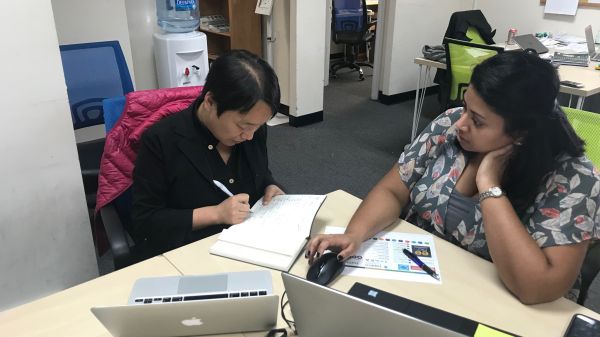Learning from Professionals: My First Week with NAAEE

FUQUN is a Chinese Non-Profit Organization with a mission to advance community-based conservation and environmental improvement in China. Environmental education is one important component of all FUQUN’s projects, and how to enhance our organization’s professionals is one of the most prioritized tasks on our agenda. As an Environmental Educator and Co-founder of FUQUN, I strongly feel the urgent necessity to strengthen individuals and institutional capacity. So, I am very pleased and honored to be directly working with the North American Association for Environmental Education (NAAEE), the professional association, champion, and backbone organization for the field of environmental education that started in 1971.
My fellowship started on 15 October 2018 and will last for four weeks. In the first week (15 to 19 October 2018), I was overwhelmed by the professionalism, enthusiasm, and hospitality of NAAEE team members, including Judy Braus, the Executive Director; Anne Umali, Project Manager, ee360; Melissa Taggart, Director of International Programs; Sarah Bodor, Director of Policy & Affiliate Relations; Nina Hamilton, Consultant for International Programs; Sai Muddasani, Communications & Web Specialist; Tia Watkins, EE Program and Administration Specialist; and Regina Fong, Administrative and Program Assistant.
Orientation meetings were kindly organized so that I am able to have better understanding of NAAEE’s mission, vision, strategies, as well as its superb programmes on driving excellence, cultivating collective action, and mobilizing multi-sector support. I also dived into the ocean of online learning resources like a kid searching for pearls, with the ambition to read and find answers to multiple questions in my brain.
Time flies and the second week placement already started! Sitting in this lovely NAAEE office, I’d love to share three main take-aways from the first week, and positively expect for the appearance of more deep-sea treasures, especially those relevant with community engagement and eco-schools.
Professional Network of Networks
The tag line “Network of Networks” became very impressive during Anne’s orientation. Besides improving professions, NAAEE supports its Affiliate Network, which has more than 50 state, provincial, and regional affiliates, representing 20,000 environmental educators throughout the world. By working together, NAAEE and its Affiliate Network form the power to change the world through education.
Looking back to China, Environment (or Nature) Education is becoming trendy. The China Nature Education Forum conducted a survey of the Nature Education Sector in 2016 with participation of 175 organizations[1]. Though there is no official data on the exact number of Nature Education organizations in China yet, research showed rapid increasing of such organizations since 2010. Given the fact that most of the survey organizations are quite new and less developed, it is crucial to build up the staff and organizations’ capacity to respond to vast market demands. However, there is no umbrella organization like NAAEE yet in one of the world’s largest countries!
I had to say that’s a pity and urge formation of a national-level professional entity to boost environment education in China.
Driving Excellence through powerful but free information portal
With its 47 years experience on environment education and its diverse high-profile professionals, NAAEE contributes to the world a large amount of high-quality learning resources, which are free for downloading in its big family of websites or in hard copy publications. One highlight of NAAEE brainchildren is the Guidelines for Excellence series, ranging from Early Childhood, K-12 students, informal environmental education programs, to community engagement. In 2017 only, NAAEE hosted 26 workshops and served 700 educators. Its ee360 project, newly launched in 2017, has conducted over 260 learning activities that directly reached 9,000 educators and reached 1 million indirectly.
Cultivation and development of professional environment educators is the highest priority in China. Nature education organizations research in China showed that over 85% of investigated nature education organizations had less then 10 full-time staff, in which over 60% have up to five staff.Among these organizations, 75.71% are facing challenges from lack of professionals.
Despite the severe shortage of environment education educators, there is no high profile, user-friendly and free capacity building resources in China yet. Similar to NAAEE, which had its 47th annual conference in 2018, the annual China National Nature Education Forum, which started in 2014, has the common aim of information sharing, collective learning, and profession development. However, one annual event is not sufficient. A series of creditable, accessible, specific training materials tailor-made for Chinese situations, as well as particular, systematic coaching activities are essential to develop environment education professions.
Research and Evaluation
Rather than spending resources in research, Chinese nature education organizations prefer to bend heads on conducting educational activities or implementing projects with the purpose of meeting goals set in project proposals. However, it is a question hanging in my mind before my arrival in U.S. – Why shall donors support your environment education program, which sounds meaningful, but the impact is very rare or hardly visible?In other words, how can you prove the effectiveness of environment education through a short-time period project?
I am very surprised to know NAAEE has started the eeWORKS project to demonstrate the evidence-based outcomes of Environment Education through intensive researches! By partnering with Stanford University and other organizations, NAAEE conducted comprehensive literature reviews of 119 peer-reviewed studies published over a 20-year period (1994-2013) and translated key findings on the impact and value of environment education into communication tools to benefit the field. The research showed that:
98% studies saw positive impact on K-12 students gained knowledge from environment education;
90% studies showed increased skills;
86% reported positive changes, and,
80% demonstrated enhanced environment related behaviors.
Although I am expecting longitudinal studies on the impact of environment education, as what has been done in medical or anthropological studies, this literature review is so far the best evidence for communicating the power of environment education. I am looking forward to knowing the outcome of ongoing research on the Benefits of EE and Nature Connections in Early Childhood, and the Impact of EE on Conservation and Environmental Quality.
To sum up, the first week with NAAEE was very inspiring and informative. I am eager to get more involved in strategic issues including reviewing of strategy and human resources management, as well as meeting with wonderful NAAEE Affiliates, and participating in some site visits and field work.
[1] Link to the report http://www.natureeducationchina.org/?p=1908

Comments
In reply to 1339 by Xavier Fazio
thank you, Anne! I have learned more from you and other NAAEE team members.
Thank you so much for sharing! Looking forward to working with you over the next month. We have so much to learn from your experience with Future Generations China.